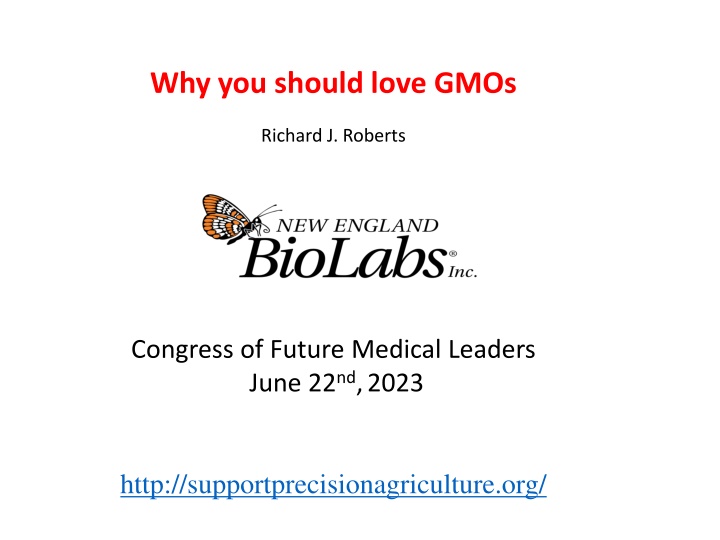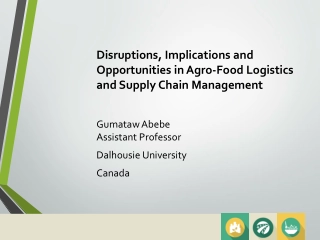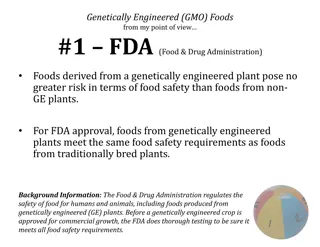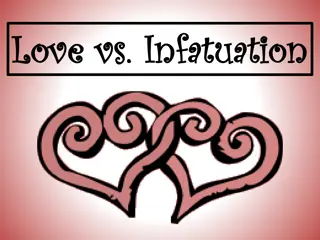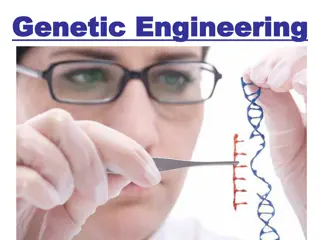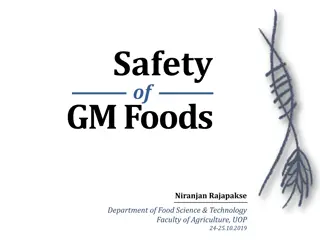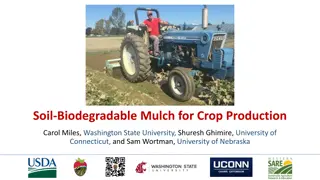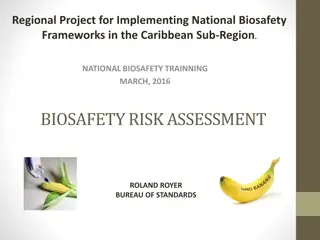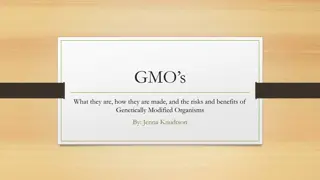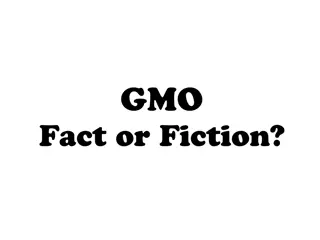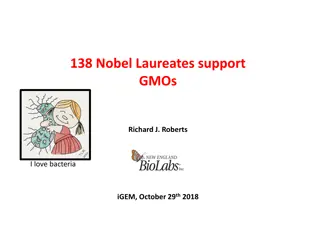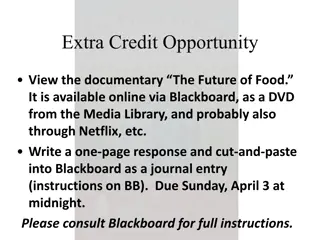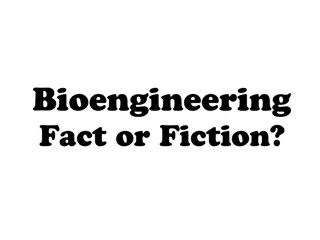Why you should love GMOs
The discussion highlights the benefits of genetically modified organisms (GMOs) in addressing global challenges like food security and climate change. It challenges misconceptions, emphasizing the safety and potential of GMO technology supported by Nobel Laureates. The content showcases how GMOs, through biotechnology and plant breeding methods, offer solutions to improve crop yield, nutritional value, and sustainability. It urges for a shift in perspective towards GMOs by debunking myths and addressing hypocrisy in anti-GMO movements.
Uploaded on Mar 05, 2025 | 0 Views
Download Presentation

Please find below an Image/Link to download the presentation.
The content on the website is provided AS IS for your information and personal use only. It may not be sold, licensed, or shared on other websites without obtaining consent from the author.If you encounter any issues during the download, it is possible that the publisher has removed the file from their server.
You are allowed to download the files provided on this website for personal or commercial use, subject to the condition that they are used lawfully. All files are the property of their respective owners.
The content on the website is provided AS IS for your information and personal use only. It may not be sold, licensed, or shared on other websites without obtaining consent from the author.
E N D
Presentation Transcript
Why you should love GMOs Richard J. Roberts Congress of Future Medical Leaders June 22nd,2023 http://supportprecisionagriculture.org/
Misinformation and Disinformation in Science 1. Vaccine Misinformation 2. Vaccine Disinformation 3. Climate change isn t real 4. The power of Social Media 5. Where do you find scientific facts?
Climate change is devastating life as we know it Also remember that for the 800 million who go to bed hungry at night FOOD is MEDICINE Greenhouse gas emissions are a major problem BIOENGINEERED CROPS can HELP
The term Genetically Modified Organism is misleading Every life form on this planet has been genetically modified by evolution Plant and animal breeding has been practiced for centuries and involves genetic modification.
Hypocrisy abounds within the anti-GMO movement Why don t they stop human insulin production for diabetics? Why do they accept vaccines for COVID-19 within 12 months of development? Why do they allow millions of tons of GMO products to be used to feed animals for human consumption?
Plant Breeding Methods 1. Traditional breeding - 50/50 mixture of genes 2. Original GMO method one or more known genes inserted into the plant genome at unknown locations 3. CRISPR methods a) specific cleavage at known locations to delete genes or make specific mutations = to traditional methods b) cleave at a known location and insert a specific gene
161 Nobel Laureates have supported an open letter to Greenpeace and every UN Ambassador urging an acknowledgment that GMO technology is basically safe and should be supported for the sake of the developing world, who desperately need better yielding crops with added nutritional value. https://supportprecisionagriculture.org/
Traditional versus precision methods I want to move a GPS system from my old car into my new one Should I disassemble two cars, mix up the parts and then select for the one with the GPS, ignoring what else it might have picked up? Or should I take the GPS from one car and move it to the other?
Traditional versus precision methods If I take a GPS from an airplane will the new car fly?
Genetic Modification refers to a method But what is important is the PRODUCT not the METHOD This is just as true for traditional breeding
Food in Developing Countries Africa, S. America, Asia need better crops with higher yields. They need the products of precision breeding Europe doesn t So why doesn t Europe endorse this? Could it be politics, or money or both?
The Real Problem Europeans did not want US companies to control their food How can that be prevented? Ban Monsanto and the other big US agribusinesses Not so fast - the farmers buy their seeds from them
The Green Parties Solution Assert that GMO methods might be dangerous! The politicians and the green parties will protect you from this risk by banning GMOs Best of all This has no economic consequence for Europe !
The Precautionary Principle If innovation might cause harm and there is no proof that it is safe Wait until scientific evidence is available But how much evidence is enough? Insulin for diabetics, cheese, wine, bread Vaccines for COVID-19
The tragic consequences Not content with blocking precision agriculture in Europe many politicians and NGOs like Greenpeace and Friends of the Earth have been sending missionaries to the developing countries Is Europe once again trying to instill their values on Africa?
A case study Vitamin A-deficiency Global population mortality (in millions) Vitamin A-deficiency 1.9-2.7 HIV/Aids 1.7 Tuberculosis 1.4 Malaria 0.75 *Courtesy of Ingo Potrykus
Golden Rice A new source of Vitamin A Tony Alfonso Suggested by Peter Jennings in 1984 Brought to fruition by Ingo Potrykus, ETH Zurich Peter Beyer, U. Freiburg Courtesy of Ingo Potrykus
Golden Rice Became a reality in February, 1999. Could have begun the improvements necessary for commercial production in the field within 2-5 years But it s a GMO and only recently available in the Philippines Multiple years of delay due to regulation and opposition. Courtesy of Ingo Potrykus
Since 2005 millions of children have died or suffered because of Vitamin A deficiency How many must die before we consider this a crime against humanity ?
Some positive examples of common sense Golden Rice approved in the Philippines Bt Brinjal approved in Bangladesh Bt Cotton approved in many countries Bt corn approved in many countries Rainbow papaya approved in the US GMO mustard approved in India Bt Cowpea approved in Nigeria
GMO crops under development Bananas Kenya/Uganda Casava Kenya/Uganda Drought-resistant Wheat many countries Increased protein content of Sorghum Australia More nutritious Tomatoes Japan Increased yield for Alfalfa Argentina Herbicide tolerant Oilseed Rape China + hundreds more
Food choice is a luxury of the developed world If you don t want to eat foods derived by GM techniques, then don t. It s your choice But don t pretend such foods are dangerous If anything They are probably safer than traditional foods
Science Facts For developed countries food is not a problem. We must never forget the consequences of our actions for the developing countries We need more science in politics And less politics in science
Actions needed around the world Politicians should listen to the scientists they fund Stop supporting the idea that foods produced by modern breeding methods must be inherently more dangerous than traditional methods, when science shows they are not
Civil Society must play its role too The major religious leaders should speak out Groups such as the Rotary Clubs should speak out Influential celebrities should speak out The media should present science facts not science fiction
CONGREGATION FOR DIVINE WORSHIP AND THE DISCIPLINE OF THE SACRAMENTS Prot. N. 320/17 Circular letter to Bishops on the bread and wine for the Eucharist . . . . 5. The same Congregation also decided that Eucharistic matter made with genetically modified organisms can be considered valid matter (cf. Letter to the Prefect of the Congregation for Divine Worship and the Discipline of the Sacraments, 9 December 2013, Prot. N. 89/78 44897).
Some positive signs Finland s Green Party supports GMOs England relaxes regulations on GMO production ko-Progressives Netzwerk in Germany supports evidence-based legislation Gene-edited crops now face relaxed regulation in many countries 46 countries now have official approval for at least one GMO crop Europeans are increasingly concerned about diminished crop yields Soybean around the world is almost all GMO extensive use for animal feed
Have a heart Non-GMO is a Western indulgence of the rich It doesn t work for the poor in Africa who ask Will I eat today? Not, What will I eat today?
